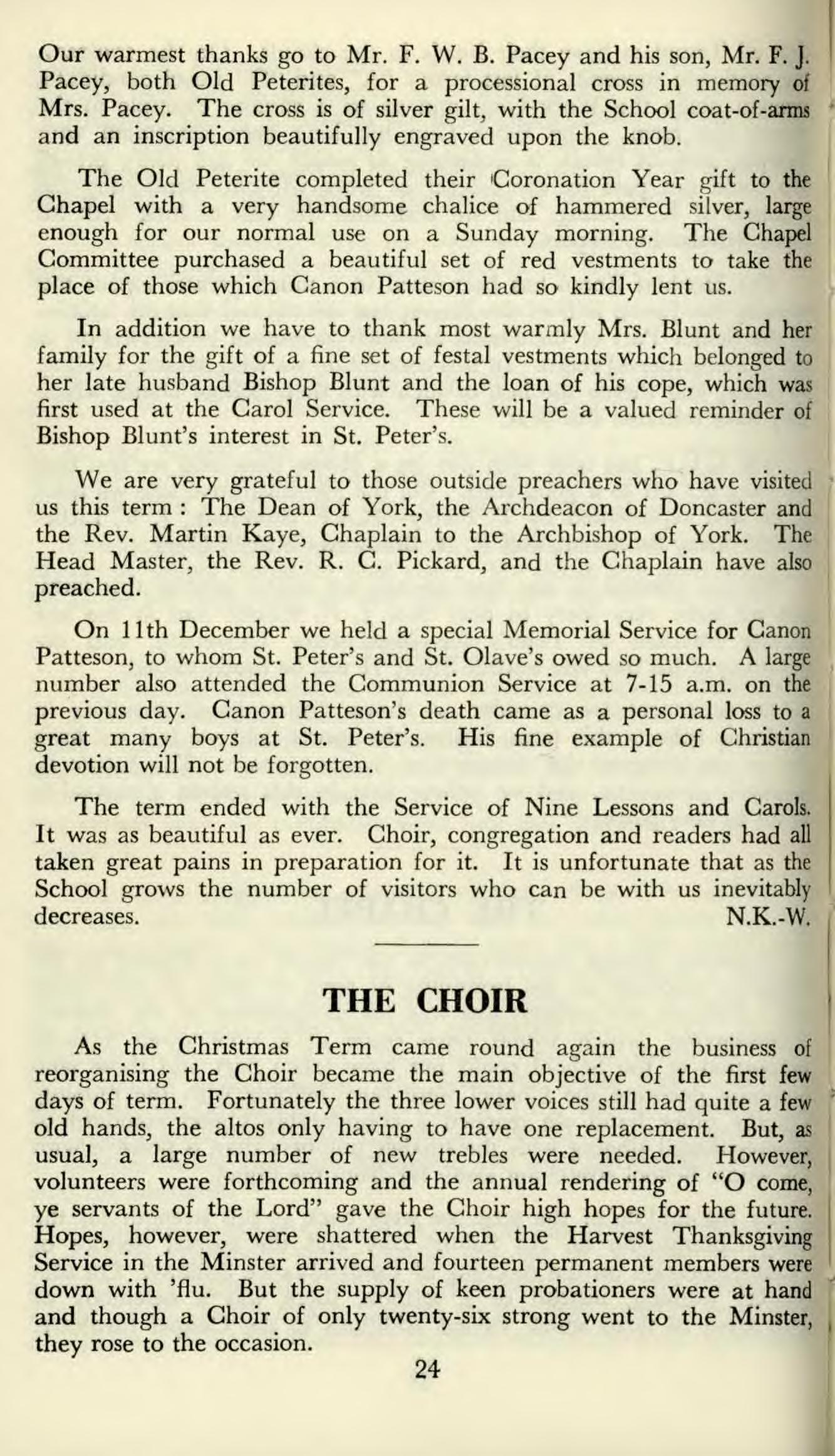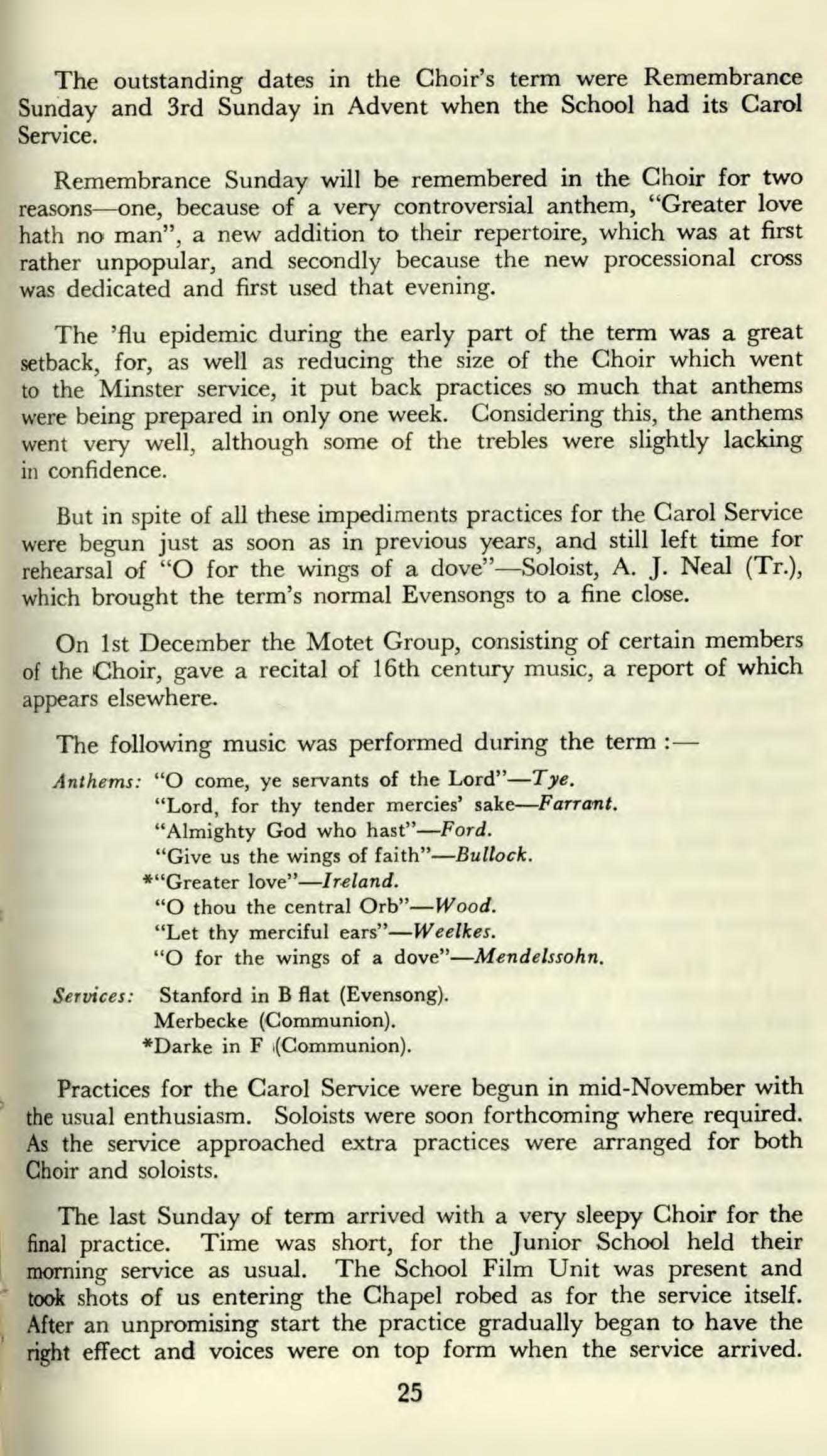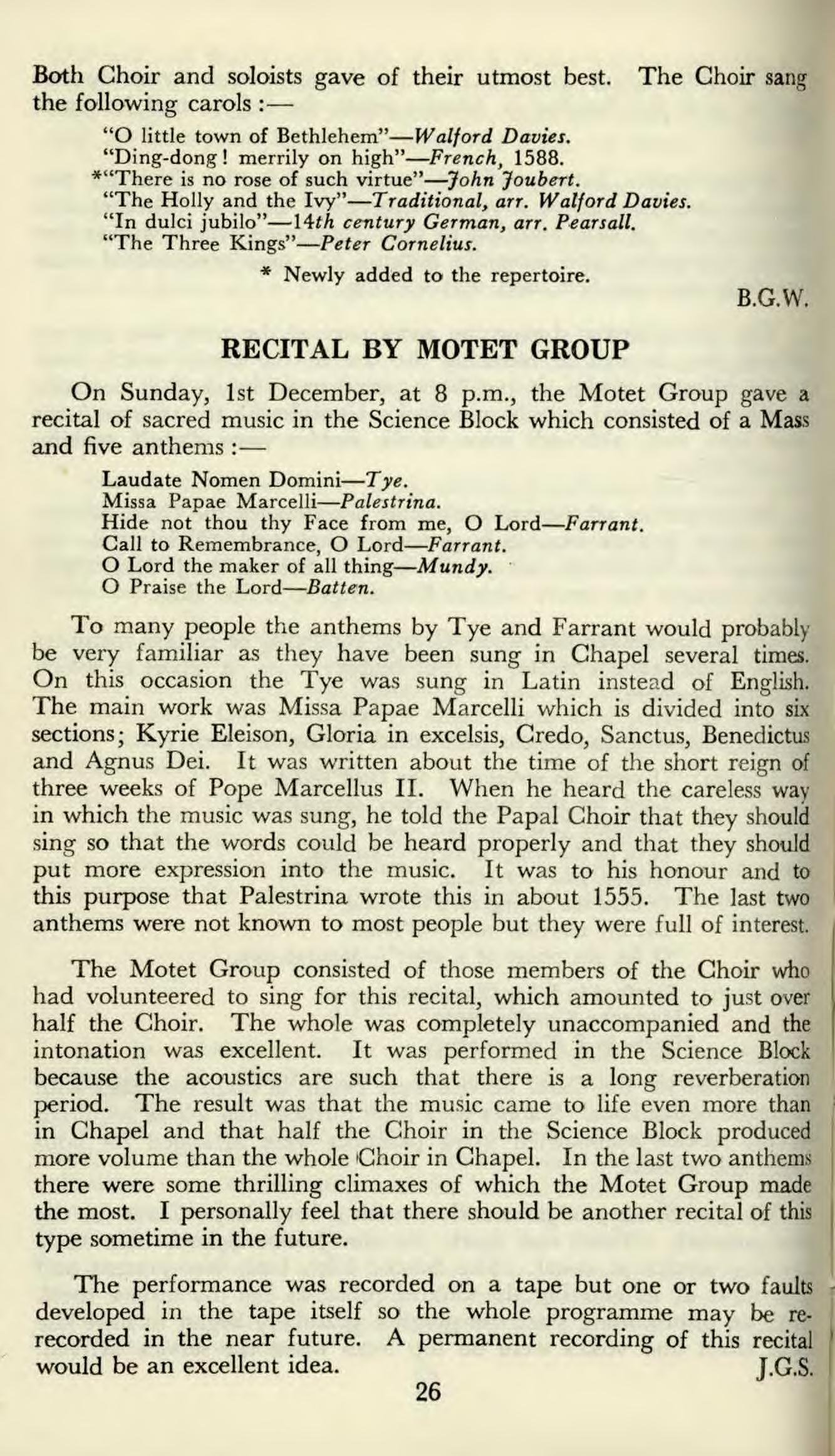
6 minute read
The Choir
from Feb 1958
by StPetersYork
Our warmest thanks go to Mr. F. W. B. Pacey and his son, Mr. F. J. Pacey, both Old Peterites, for a processional cross in memory of Mrs. Pacey. The cross is of silver gilt, with the School coat-of-arms and an inscription beautifully engraved upon the knob.
The Old Peterite completed their Coronation Year gift to the Chapel with a very handsome chalice of hammered silver, large enough for our normal use on a Sunday morning. The Chapel Committee purchased a beautiful set of red vestments to take the place of those which Canon Patteson had so kindly lent us.
In addition we have to thank most warmly Mrs. Blunt and her family for the gift of a fine set of festal vestments which belonged to her late husband Bishop Blunt and the loan of his cope, which was first used at the Carol Service. These will be a valued reminder of Bishop Blunt's interest in St. Peter's.
We are very grateful to those outside preachers who have visited us this term : The Dean of York, the Archdeacon of Doncaster and the Rev. Martin Kaye, Chaplain to the Archbishop of York. The Head Master, the Rev. R. C. Pickard, and the Chaplain have also preached.
On 11th December we held a special Memorial Service for Canon Patteson, to whom St. Peter's and St. Olave's owed so much. A large number also attended the Communion Service at 7-15 a.m. on the previous day. Canon Patteson's death came as a personal loss to a great many boys at St. Peter's. His fine example of Christian devotion will not be forgotten.
The term ended with the Service of Nine Lessons and Carols. It was as beautiful as ever. Choir, congregation and readers had all taken great pains in preparation for it. It is unfortunate that as the School grows the number of visitors who can be with us inevitably decreases. N.K.-W.
As the Christmas Term came round again the business of reorganising the Choir became the main objective of the first few days of term. Fortunately the three lower voices still had quite a few old hands, the altos only having to have one replacement. But, as usual, a large number of new trebles were needed. However, volunteers were forthcoming and the annual rendering of "0 come, ye servants of the Lord" gave the Choir high hopes for the future. Hopes, however, were shattered when the Harvest Thanksgiving Service in the Minster arrived and fourteen permanent members were down with 'flu. But the supply of keen probationers were at hand and though a Choir of only twenty-six strong went to the Minster, they rose to the occasion.
The outstanding dates in the Choir's term were Remembrance Sunday and 3rd Sunday in Advent when the School had its Carol Service.
Remembrance Sunday will be remembered in the Choir for two reasons—one, because of a very controversial anthem, "Greater love hath no man", a new addition to their repertoire, which was at first rather unpopular, and secondly because the new processional cross was dedicated and first used that evening.
The 'flu epidemic during the early part of the term was a great setback, for, as well as reducing the size of the Choir which went to the Minster service, it put back practices so much that anthems were being prepared in only one week. Considering this, the anthems went very well, although some of the trebles were slightly lacking in confidence.
But in spite of all these impediments practices for the Carol Service were begun just as soon as in previous years, and still left time for rehearsal of "0 for the wings of a dove"—Soloist, A. J. Neal (Tr.), which brought the term's normal Evensongs to a fine close.
On 1st December the Motet Group, consisting of certain members of the Choir, gave a recital of 16th century music, a report of which appears elsewhere.
The following music was performed during the term :-

Anthems: "0 come, ye servants of the Lord"—Tye. "Lord, for thy tender mercies' sake—Farrant. "Almighty God who hast"—Ford. "Give us the wings of faith"—Bullock. *"Greater love"—Ireland. "0 thou the central Orb"—Wood. "Let thy merciful ears"—Weelkes. "0 for the wings of a dove"—Mendelssohn. Services: Stanford in B flat (Evensong). Merbecke (Communion). *Darke in F (Communion).
Practices for the Carol Service were begun in mid-November with the usual enthusiasm. Soloists were soon forthcoming where required. As the service approached extra practices were arranged for both Choir and soloists.
The last Sunday of term arrived with a very sleepy Choir for the final practice. Time was short, for the Junior School held their morning service as usual. The School Film Unit was present and took shots of us entering the Chapel robed as for the service itself. After an unpromising start the practice gradually began to have the right effect and voices were on top form when the service arrived.
25
"O little town of Bethlehem"—Walford Davies. "Ding-dong ! merrily on high"—French, 1588. *"There is no rose of such virtue"—John 7oubert. "The Holly and the Ivy"—Traditional, arr. Watford Davies. "In dulci jubilo"-14th century German, arr. Pearsall. "The Three Kings"—Peter Cornelius. * Newly added to the repertoire.
B.G.W.
RECITAL BY MOTET GROUP
On Sunday, 1st December, at 8 p.m., the Motet Group gave a recital of sacred music in the Science Block which consisted of a Mass and five anthems :—
Laudate Nomen Domini—Tye. Missa Papae Marcelli—Palestrina. Hide not thou thy Face from me, 0 Lord—Farrant. Call to Remembrance, 0 Lord—Farrant. O Lord the maker of all thing—Mundy. O Praise the Lord—Batten.
To many people the anthems by Tye and Farrant would probably be very familiar as they have been sung in Chapel several times. On this occasion the Tye was sung in Latin instead of English. The main work was Missa Papae Marcelli which is divided into six sections; Kyrie Eleison, Gloria in excelsis, Credo, Sanctus, Benedictus and Agnus Dei. It was written about the time of the short reign of three weeks of Pope Marcellus II. When he heard the careless way in which the music was sung, he told the Papal Choir that they should sing so that the words could be heard properly and that they should put more expression into the music. It was to his honour and to this purpose that Palestrina wrote this in about 1555. The last two anthems were not known to most people but they were full of interest.
The Motet Group consisted of those members of the Choir who had volunteered to sing for this recital, which amounted to just over half the Choir. The whole was completely unaccompanied and the intonation was excellent. It was performed in the Science Block because the acoustics are such that there is a long reverberation period. The result was that the music came to life even more than in Chapel and that half the Choir in the Science Block produced more volume than the whole Choir in Chapel. In the last two anthems there were some thrilling climaxes of which the Motet Group made the most. I personally feel that there should be another recital of this type sometime in the future.
The performance was recorded on a tape but one or two faults developed in the tape itself so the whole programme may be rerecorded in the near future. A permanent recording of this recital would be an excellent idea. J.G.S. 26











